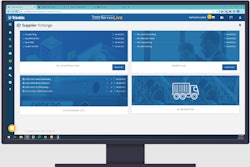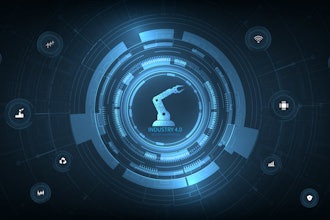For any successful football team, the quarterback is a key player, if not THE key player on the team. The quarterback is a key part of the system created by the coaches, plays, and strategies. Their performance and ability creates trust and belief for the team. They alone can make or break a game, or even a season.
If you think about the concept of team at your industrial distribution company, do you have a great quarterback? Do you have people and systems in place—a true platform—to create trust and belief, and ensure performance?
Football announcers always talk about how the quarterback is key to creating a belief in each other within the team, and that is what makes them perform and win, even in chaotic situations. Belief in team and having a strong quarterback is an excellent analogy for industrial distribution and the need for e-commerce systems, or “platforms.”
“Team” in today’s distribution world means a mix of people, systems, and practices that work together and perform every day for customers. The more systems and practices that work well, the more confidence and belief is created. When everything is working well, less time is spent fixing and remedying, and more time is created for innovation and growth. More now than ever before, your “team” has to have equal parts “people” and “systems.” E-commerce is not just a transaction online.
The key system that gives your team ‘belief’ is the “distribution” part of your business. Back 20 years ago, if you could ship the right stuff on time, that was enough.
We used to say: Ship the S**t! But that was the hardest part of the business. It still is. Now, it’s more complicated. Integration of e-commerce, order entry, purchasing, inventory management, shipping, and logistics is crucial. And let’s not forget things like VMI, replenishment systems, special orders for metalworking, and customer support. For today’s modern distributor, these are not simply “nice to have’s.” The integration of all of these things is vital to service the customer, and to survive competitors.
What every distributor needs is a true platform, a foundation on which the distributor’s business is run. All the pieces of the distribution business need to work together, every day. In football terms, the platform is the quarterback.
How many times have you lost a customer due to your inability to process an order on time or a system was down, or a phone call was missed? How many sales people have quit due to losing faith in the company and systems in place? How many times have your sales people had to explain delays and say, “we are working on our website…”
If the quarterback is so important, why don’t you have one yet?
Some distributors choose to build this platform on their own, integrating separate pieces of software, data assets, and e-commerce technology to build a platform. But, as independent distributors and industry magazines have explained before, the process of building this platform can be very time consuming, costly, and, in reality, a never-ending project and expense. Many managers buy software hoping it will work. E-commerce is the core of any platform, with modules for pricing, inventory management, order management, product and brand management (PIM) and delivery.
An alternative to build your own (BYO) is to use a platform system such as that provided by Berkshire eSupply, formerly Production Tool Supply. A platform significantly reduces costs in so many areas: headcount, software licenses, digital asset management, punch out catalogs, vendor-managed inventory, software training, hiring, inventory cost, marketing, warehousing, and even customer service.
“When you do a cost analysis, figuring in all the costs of salaries, outside programmers, integrators, training, product data management, inventory costs, and the cost of the software itself, you just scratch your head… it just does not make sense,” comments John Beaudoin, president of Berkshire eSupply. “The distributor doing $5 million to $40 million in annual sales needs a partner, and a true platform.”
Why more independent distributors have not already jumped onto an industry platform is a bit mind-boggling. Given the needs and costs explained here, plus the threat of competition from much larger industrial distributors, general suppliers like Amazon Business, and other marketplaces, one would think that every independent distributor would have partnered up on an e-commerce platform already.
Our industry is slow to change, and the gap is widening between the companies with a great quarterback and those without.
Perhaps one reason why more independent distributors have not built the quarterback is a lack of understanding about what you can and cannot do with a platform. There are several myths about platforms, but there are clear responses to them, too.
“You can’t add your own local inventory to the platform.” You can, with certain tiered programs.
“You can’t control pricing.” You can, with mid or top levels of the software as a service. Higher level programs allow you to control pricing from your ERP system, with integration to the e-commerce platform. You can often control price by brand, category, quantity, customer and region. You can also integrate the platform into your ERP, and managing pricing in one place, the ERP system, which then is copied to the e-commerce system.
“You don’t want to share your customer info or sales data with the wholesaler.” Short answer: You don’t have to. Certain platforms allow for seamless integration into your ERP, and customer data and sales data are invisible to the wholesaler.
“'Build Your Own’ systems gives us more control.” Really? Build your own systems need constant updating and tweaking, by staff that often changes or is not qualified to do the work well. Platform systems are backed by daily development and a team managing product data, brands, inventory and delivery. Every detail is thought of, with most controls given to the platform user.
Platform systems are too expensive. Really? For as little as $10,000 annually to as much as maybe $250,000, the independent distributor can partner with an industrial distribution platform company such as Berkshire eSupply. When you do the math, the cost savings of having less people on staff, less inventory and fewer meetings far outweighs $15,000, $100,000, or even $250,000 per year.
“I can manage the product data on my own.” Really? How is that going for you? With 300,000 to 1 million SKUs, and thousands of vendors, how do you manage attributes, photos, part numbers, attachments and videos with a small staff? A platform solution manages the data—a significant cost of doing business. “Product data management is the #1 reason many of our customers choose us,” says Rich Stanisz, head of e-commerce for Berkshire eSupply.
“We make more margin on our own.” Most likely this is not true in all cases. Platforms tend to have larger volume buying and discounts and might afford you the same or similar margin on many brands you buy now and significantly more margin on private label brands the platform may offer.
With these myths busted, it's possible to make a sound comparison between general B2B e-commerce software and a true industrial distribution platform:
- Companies such as Microsoft and InSite Commerce offer e-commerce systems to our industry. But the key element they are missing is product data /content management and product management. These systems do not provide the ‘guts’ of the system.
- Some platform systems out there are limited to certain product categories; you need to choose a platform that has robust product additions and categories
- The cost and time needed for managing digital product assets is overwhelming for most distributors and junk in= junk out. It’s such a crucial part of any distributor’s business. It’s hard to ever put enough bodies on it for it to be correct. Outsourcing to non-industry firms does not always work.
- General B2B platforms have an upfront cost, plus a sales commission, sometimes 2 to 3 percent annually. When you grow, your costs grow. This is not true of current platform systems built for industrial distribution, which have this cost built into product margins instead, and there is no commission fee.
- Some e-commerce software charge an additional cost for fulfillment, per order or per line item.
- Industrial distributor-specific platforms like Berkshire eSupply’s offer easy-to-create punch-out catalogs (intranets) with unique product offering and pricing. This is difficult to do with off-the-shelf B2B software.
Whether you choose to build your own or go on a platform, do something to build up belief and create that quarterback at your company.
Cathy Veri, industrial distribution consultant at marketecture, connected with Berkshire eSupply to explain the advantages of platform e-commerce for independent industrial distributors.























